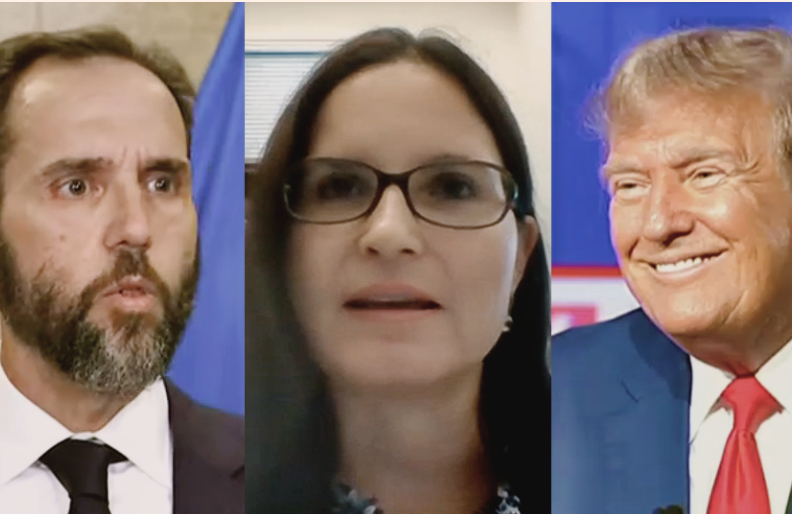Jack Smith Gets In Judge's Face - Issues Direct Threat If He Doesn't Get His Way

In a bold legal document, Special Counsel Jack Smith criticized Judge Aileen Cannon, appointed by former President Trump, over her direction to incorporate what Smith deems as Trump's "mistaken" legal defense theory into jury instructions.
Accusations have been levied against Cannon, suggesting her actions are intentionally prolonging the proceedings to benefit Trump, the president responsible for her appointment. Smith's team and Judge Cannon have clashed on several matters throughout this case.
The crux of the dispute emerged when Cannon ordered the submission of preliminary jury instructions considering "competing scenarios," a directive Smith contends is based on a fundamentally incorrect legal assumption. Smith's displeasure was palpable in his filing.
Smith immediately challenged Cannon's directive in his submission, hinting at potential "appellate action" if the judge persisted with her approach:
The Court has issued an order (ECF No. 407) directing the parties to file preliminary proposed jury instructions and verdict forms for Counts 1-32 of the Superseding Indictment, with a specific requirement that the parties “engage with [two] competing scenarios and offer alternative draft text that assumes each scenario to be a correct formulation of the law to be issued to the jury.” Both scenarios rest on an unstated and fundamentally flawed legal premise—namely, that the Presidential Records Act (“PRA”), and in particular its distinction between “personal” and “Presidential” records, see 44 U.S.C. § 2201 (2), (3), determines whether a former President is “[]authorized,” under the Espionage Act, 18 U.S.C. § 793(e), to possess highly classified documents and store them in an unsecure facility, despite contrary rules in Executive Order (“EO”) 13526, which governs the possession and storage of classified information.
That legal premise is wrong, and a jury instruction for Section 793 that reflects that premise would distort the trial. The PRA’s distinction between personal and presidential records has no bearing on whether a former President’s possession of documents containing national defense information is authorized under the Espionage Act, and the PRA should play no role in the jury instructions on the elements of Section 793. See ECF No. 373 at 5-12. Indeed, based on the current record, the PRA should not play any role at trial at all.
Moreover, it is vitally important that the Court promptly decide whether the unstated legal premise underlying the recent order does, in the Court’s view, represent “a correct formulation of the law.” ECF No. 407 at 2. If the Court wrongly concludes that it does, and that it intends to include the PRA in the jury instructions regarding what is authorized under Section 793, it must inform the parties of that decision well in advance of trial. The Government must have the opportunity to consider appellate review well before jeopardy attaches.
When Smith drafts the jury instructions that Cannon has requested, he adopts a grave tone. He uses the term “The Jury Is Incorrectly Instructed” in certain instances and a different one for his own suggested jury instruction:
The Jury Is Correctly Instructed that Unauthorized Possession Is Based on Executive Order 13526, Not on the PRA.
The Government’s proposed preliminary instruction for Counts 1 through 32 is as follows:10 Counts 1-32: Willful Retention of National Defense Information 18 U.S.C. § 793(e)
Counts 1 through 32 of the Superseding Indictment charge defendant Trump with the willful retention of national defense information in violation of Title 18 of the United States Code, Section 793(e). The statute provides, in pertinent part: “[w]hoever having unauthorized possession of . . . any document . . . relating to the national defense . . . willfully retains the same and fails to deliver it to the officer or employee of the United States entitled to receive it,” commits a crime.
In his closing remarks, Smith threatens to file an appeal. He writes, “The Court should reject the legal premise that the PRA’s distinction between personal and presidential records has any bearing on the element of unauthorized possession under Section 793(e) for the reasons set forth above and in the Government’s opposition to Trump’s motion to dismiss based upon the PRA.” As a result, it ought to reject Trump’s ongoing move for a dismissal and accept the above-mentioned preliminary jury instructions. To give the Government time to pursue an appeal, the Court should clarify its position immediately, well in advance of any potential danger, if it decides not to reject that incorrect legal presumption.